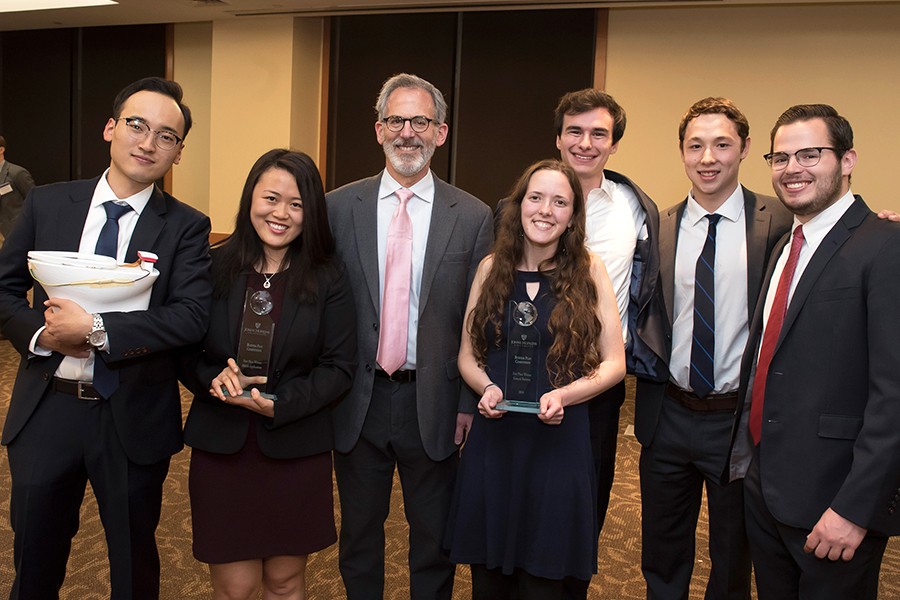Johns Hopkins engineering teams won first place in each of the four categories at the 19th annual Johns Hopkins University Business Plan Competition in a day-long event Friday that capped months of preparation and prototyping.
More than 45 judges, many of them Johns Hopkins alumni, evaluated the teams' business plans and winnowed them down from more than 50 entries to 27 finalists who competed for more than $55,000 in prize money.
Leslie Silverglide, WSE '02, co-founder and CEO of Mixt, a quick-service restaurant chain in California, opened the program with a keynote address in Charles Commons. She encouraged students to seek out mentors and take advantage of interesting internship opportunities.
"Every day, you will have a new set of problems," she told the packed room. "And you have to take them one at a time."
The students went on to pitch their ideas, including a concert truck to deliver high-quality classical music, an online platform to help college students chart their academic goals, and a personalized approach to treating type 2 diabetes.
"This is our signature event," said Pam Sheff, Director of the Whiting School of Engineering's Center for Leadership Education. "These students have been working for nearly a year, developing their pitches and trying to build their companies. It's serious business. Some of these companies are going to go live. … And even for those that don't, these students are building skills that will take them wonderful places in the future."
In the end, engineering teams took first place in the four main categories that included mobile application, medical technology & life sciences, social enterprise, and general business. First-place teams received $6,000, second-place teams got $4,000, and third-place teams won $2,500.
Business Plan Competition winners
Mobile Application: Team Toi, an affordable device placed on a toilet that automatically tracks the quality of a person's stool to gauge digestive health and detect gastrointestinal complications. Team members: undergraduates Bertha Hu, Baekchun Kim, and Sung Woo Park.
Medical Technology & Life Sciences: Team Pneumonix Medical, a medical device to help prevent the risk of lung collapse during CT-guided biopsy. Team members: Department of Biomedical Engineering's Center for Bioengineering Innovation and Design students Andrew Eisenthal, Shashwat Gupta, Sabrina Liu, Edward Ruppel, and Wade Schutte.
Social Enterprise: Team Kubanda Cryotherapy, a team that has been working for several years on an affordable and locally available breast cancer treatment method for women living in low-resource areas around the world. The device uses carbon dioixide gas as a cryogen to kill tumor cells in a minimally invasive procedure. Team members include students and former students in the Department of Biomedical Engineering: Pascal Acree, Tara Blair, Yixin Hu, Grace Kuroki, Evelyn McChesney, Shivam Rastogi, Bailey Surtees, and Serena Thomas.
General Business: Team Oravi, an immersive virtual world to help students learn foreign languages by helping them practice everyday tasks such as buying train tickets, locating hotels, or ordering meals. Team members: computer science students Michael Ashmead, Harrison Cohen, Rachel Kinney, Rachmiel Naness.
Another team recognized was Team Med Scholar, Bloomberg School of Public Health students who are developing an online platform to train and support health care workers throughout Africa. That team, including Olufemi Erinoso, Joe Amoah, and Ariel Caldwell, received $2,700 for the Accenture Award, given by Johns Hopkins alumni who work for Accenture and collected from voluntary donations.
Finally, Team DOT, including graduate students Amrita Krishnaraj and Rutvi Shah, won the Lawrence Aronhime Award, launched last year and named for the senior lecturer credited with launching the Johns Hopkins Business Plan Competition. Team DOT pitched a smart robotic toy capable of monitoring a child's psychological and physical health as a way to help detect anxiety during hospital stays.
Posted in Science+Technology
Tagged business plan competition








